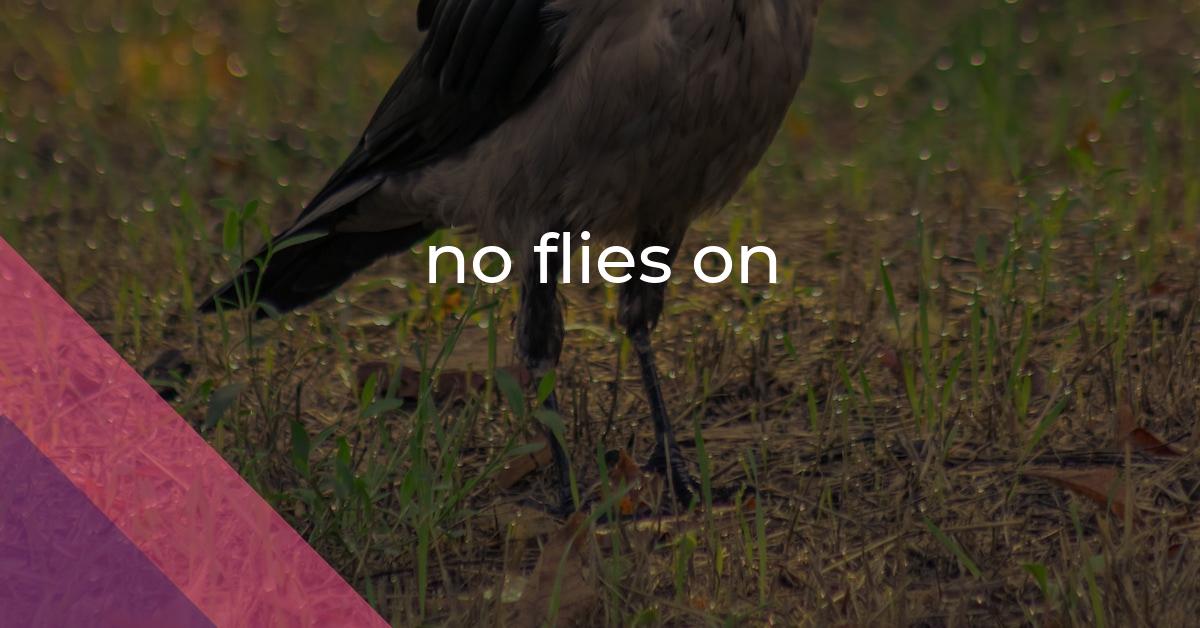no flies on: Idiom Meaning and Origin
What does ‘no flies on’ mean?
The idiom "no flies on" means someone is quick-witted or astute, characterized by being sharp and aware. It implies that the person is not easily deceived or fooled.
It originated from the observation that flies tend to gather around slow or dull-witted individuals, suggesting that a person with "no flies on" them is mentally alert and perceptive.

Idiom Explorer
The idiom *the feathers fly* means a situation where there is a lot of noise, conflict, or commotion, usually resulting in a heated argument or fight.
The idiom "on sight" means to recognize or identify something or someone immediately or without hesitation.
The idiom "no skin off one's nose" means that something does not affect or bother someone, or that they are not personally affected by a situation or outcome. It implies that the person has no reason to be concerned or worried about the matter.
The idiom "no-frills" means basic or without any unnecessary or luxurious features. It refers to something that is simple, straightforward, and without any extra embellishments or additions.
The idiom *no-count* refers to a person or thing considered worthless or of no value. It is often used to describe someone who is lazy, unreliable, or lacking in ambition or ability.
The idiom "no bones about it" means to be straightforward and honest about something without any hesitation or doubt.
The idiom "no harm, no foul" means that if no damage or harm has been done, then there is no need to be upset or hold someone responsible for their actions.
Unmasking the Intended Implication
The idiom "no flies on" is a colorful and intriguing expression that has its roots in British English. It is commonly used in idiomatic language and has made its way into American English as well, although to a lesser extent. This idiom is typically used to describe a person who is quick-witted, alert, or shrewd.
The origin of the phrase "no flies on" can be traced back to the behavior of flies being attracted to and feasting on unclean or slow-moving individuals or animals. Therefore, when we use this idiom, we are suggesting that the person being referred to possesses none of those undesirable or lazy qualities. Instead, the idiom implies that the person is always one step ahead, not allowing any metaphorical flies to settle on them.
An example of the idiom in use is when someone says, "There are no flies on him." This is a direct way of stating that the person in question is clever and always alert, not allowing any opportunity to be missed or taken advantage of. It is a way of praising someone's intelligence, quick thinking, or ability to stay on top of things.
On the other hand, "no flies on" can also be used in a negative context. For instance, if someone says, "There are flies on him," it means the person is exhibiting qualities that make them less intelligent or alert.
It is worth noting that "no flies on" is an informal expression and is commonly used in colloquial language. While it may not be suitable for formal or professional settings, it adds color and colloquialism to everyday conversations. This idiom is often used in spoken English, particularly in British English, and can be found in literature and popular culture to add a touch of authenticity and character to characters or dialogue.
Another related idiom is "hurt a fly." This phrase is used to describe a person who is extremely gentle or non-violent. Someone who wouldn't even harm a fly is seen as being peaceful and harmless. It is the complete opposite of someone who is aggressive or violent.
Similarly, the idiom "catch flies" refers to someone who is easily distracted or lacks focus. It suggests that the person is constantly getting sidetracked or losing their attention. They are not able to concentrate on the task at hand and are instead "catching flies." This idiom is often used humorously to lightly tease someone about their lack of focus or distractibility.
The idiom "on the fly" means to do something quickly or on the spot. It implies that the action is being taken without much thought or planning. It can refer to making decisions or solving problems in a spontaneous manner, without taking the time to consider all the options. This idiom suggests that the person is able to make quick decisions and adapt to changing circumstances.
Another related idiom is "fly low." This phrase is used to describe someone who is being secretive or trying to avoid attention. It suggests that the person is attempting to remain unnoticed or hidden. Just as a fly might try to stay low to avoid being swatted, someone who is "flying low" is trying to stay under the radar or keep a low profile.
The idiom "fly off" is used to describe someone who is leaving hastily or impulsively. It suggests that the person is departing quickly and without hesitation. It can also imply that the person is leaving in a hurry or in an unplanned manner. This idiom is often used when someone is leaving a situation, whether it be a conversation, a room, or even a job, in a sudden and somewhat abrupt manner.
The idiom "no flies on" is a distinctive phrase that describes a person who is quick-witted, alert, and clever. It originated from the association of flies with uncleanliness and slow-moving individuals. This idiom is used both positively and negatively to describe a person's intelligence and alertness. It is more commonly used in British English, but can also be found in American English to a lesser extent. While informal in nature, this idiom adds color and character to everyday language, making it a fascinating and versatile expression in the English language.
Example usage
Examples of how the idiom "no flies on" can be used in a sentence:
- He's always one step ahead, no flies on him.
- Betty can handle any situation with ease, no flies on her.
- They say John is lazy, but no flies on him when it comes to getting things done.
More "Animals" idioms



